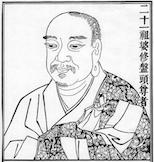Koso Wasan 15
The immovable sages, who were formally humans and devas,
Are born from the ocean of wisdom, the universal Vow;
The virtues of their mental activity are pure
And free of discrimination, like empty space.
Visions of Peace

Those dwelling in the Pure Land are immovable (that is, still or quiet - Jp. fudo) and their afflicting passions (bonno, Sk. klesha) have passed away because the fulfilled Pure Land is nirvana. They are 'born from the ocean of wisdom', the universal Vow, and are free of all discrimination, which is the antithesis of true compassion.
Such an existence contrasts with monasteries (secluded places: Sk. vihara) and monastic life, which are mere mundane yearnings for the enduring reality of the Pure Land. Such places are a common feature of most schools of the Buddha Dharma. Temples, gardens and monasteries are much sought after by followers of the dharma. The Buddha Dharma was the first religion in human history to actively seek harmony and serenity as the abode of those who follow it.
Monasteries across central, southern and eastern Asia are all described as 'seculded places' (Sk. vihara). Calmness and harmony are greatly prized by the dharma because it is based upon the realisation that the cause of suffering is desire (Sk. trsna) and the afflicting passions (Sk. klesha) which feed it. A starting point in addressing these problems is to become calm and reflect upon our human condition with a view to recognising within ourselves the causes of our suffering and removing them. Although, people of shinjin know it as being 'born from the ocean of wisdom, the universal Vow'.
There can be little doubt that Vasubandhu lived in a 'secluded place' (Sk. vihara) and in the verse, which inspired this verse of the wasan, he describes his experience of insight (Sk. vipasyana) into the transcendent 'secluded place' that is the Pure Land. There he sees practicers of the dharma fully able to achieve profound depths of samadhi because they are completely free from any viciousness that may distract them. In his worldy environment, Vasubandhu would probably have sought to replicate this same level of serenity, harmony and inner peace. Very often we read that monasteries did achieve something similar; although there were times when the vicissitudes of mundane existence overcame their serenity.
Anything in the environment of a monastery, which threatened to arouse the kleshas or inhibit the search for inner peace, was removed. Killing and sexual activity was especially forbidden, along with food thought to arouse the passions. Vistors at the monasteries were welcomed, provided that they adhered to rules shared in common with residents. Many laymen throughout Buddhist history are known to have sought 'time out' from the stresses of the world by seeking a time of retreat in monasteries. During this time, they must live by the ten precepts for novices.
'Secluded places' appeared in mountains or on isolated hillsides. By the seventh century they extended from Sri Lanka in the south to Lake Baikal in the north and from Afghanistan in the west to Nara in the east. These places were home to hundreds of thousands of monastics. They were places of learning and deep thought.
A few centuries after Vasubandhu's time, the network of secluded places seems to have broken down. His own country, Gandhara, was subject to a series of invasions, which became more and more violent. In central Asia, there is evidence that monasteries tended to become powerful centres of a feudal social order. This, in turn, bred resentment and anger among the populace.
In time, lay-people in the Middle East and Central Asia forsook the Buddha Dharma for Islam, which offered more tangible solace and guidance for people immersed in family life and who needed to work at farming, manufacturing or trade to support them. It is said that, at this time, and for the same reasons, the Buddha Dharma became more lively as a religion for lay-people. The Pure Land way, especially, attracted followers from the merchant and farming classes, householders who owned property and ran businesses.
The silence of monasteries gave way to chanting of the nembutsu, in fields and homes. Especially in Japan, the Pure Land way had left the monastic environment almost completely by the end of the fifteenth century. The sounds and fury of war and a succession of plagues raging across central Asia gradually brought the prominence of the monastic life into decline. Invasions by European colonists, the attractiveness of Islam and Christianity to the colonised, the introduction of industry and commerce, and the inexorable growth of the consumerist modality, have further encouraged the decline of the places of peace.
Now the vision of peace has almost dimmed. There is nowhere we can go to find true silence and calm repose. One of the features of life in a 'secluded place' is that it follows the natural rhythms of life, moving silently by as each day passes. In our large cities many of us live in fishbowl-like houses, which have double-glazing and air-conditioning. We only come into contact with the natural world momentarily and cannot endure silence at all. Moreover, we have become addicted to endless idle chatter and even malicious gossip, thanks to the bourgeoning social networking platforms.
There are still occasions when we can glimpse the old aspiration for a peaceful environment that the dharma sought: in chanting sutras or the nembutsu. There are also moments of solitude when things fall silent and we can hear the breeze in the trees or listen to the beat of our hearts. Even in public places we can glimpse moments of peace, in a fellow-passenger at an airport absorbed in a book, or by looking up at the clear blue sky. There can yet be moments when we find what the early Buddhists sought. Although the occasions when we do find it seem to be external, the peace we discover is really from within our own hearts and minds.